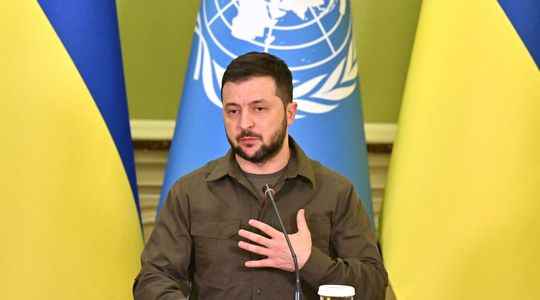A week described as “historic” opens this Monday, June 20 according to the Ukrainian president. It is to be expected “that Russia will intensify its attacks this week”, warned Volodymyr Zelensky, a few days before the discussions of the Twenty-Seven on a candidacy of kyiv to the European Union. “Since 1991, there have been few decisions as fateful for Ukraine as the one we await today,” he added in a video message posted on Sunday, saying he was “convinced that only a positive response is in the interest of all of Europe”.
The European Commission on Friday recommended granting Ukraine EU candidate status. His opinion will be discussed next Thursday and Friday at a European summit, where the 27 leaders of the Union will have to give the green light – unanimously – for kyiv to officially obtain this status.
- Towards an intensification of Russian attacks
Until then, “obviously, we expect Russia to intensify its attacks this week,” warned the Ukrainian president. “We are ready,” he commented.
According to Volodymyr Zelensky, the Russians “regroup their forces in the direction of Kharkiv (northeast) and in the region of Zaporijjia (south), and are still bombarding our fuel infrastructure”. But “we will respond to these attacks”, he assured, while conceding “significant losses”. “Our army is holding up.”
The Russians “attempted a breakthrough in the Toshkivka area, they were partially successful, but our artillery worked and we can say that the breakthrough attempt was not successful”, also reported Sergei Gaïdaï, governor of the province of Lugansk, which constitutes, with that of Donestk, the Donbass.
- Street fights are brewing in Lysychansk
Toshkiva lies south of Lyssychansk, itself separated from Severodonetsk by the Donets River alone. In Lysychansk, there are signs of preparations for street fighting: soldiers are digging holes and putting up barbed wire, and police are placing burnt-out vehicles across the streets to slow traffic. Serguiï Gaïdaï also denied Sunday on Telegram the total capture of Severodonetsk by the Russians, acknowledging however that they “control the majority”.
The Russian Ministry of Defense for its part claimed the capture of Metolkine, in the south-eastern outskirts of Severodonetsk. Fighting is raging around this key agglomeration to gain control over the whole of Donbass, partially controlled by pro-Russian separatists since 2014. On the southern front, the Ukrainian army assures that the Russian forces, “unable to advance on the ground”, proceed by bombardment.
The Russian ministry said on Sunday that it had hit a factory in Mykolaiv (south) with cruise missiles, and destroyed “ten 155 mm M777 howitzers and up to twenty armored vehicles supplied to the kyiv regime by the West during of the past ten days. Statements impossible to verify from an independent source.
This port and industrial city of almost half a million inhabitants before the war is still under Ukrainian control, but it is close to the Kherson region, almost entirely occupied by the Russians. It remains a target of Moscow because it is on the road to Odessa, Ukraine’s largest port, 130 km to the south-west near Moldova, also still under Ukrainian control and at the center of discussions on the blocked export of millions of tons of Ukrainian grain.
This war could last “for years”, said Sunday in the German daily Bild the secretary general of NATO, Jens Stoltenberg, calling on Western countries to support kyiv in the long term. Facing the EU, Moscow holds the weapon of hydrocarbons. Countries like Germany are seeking to compensate for the declines in Russian gas deliveries, even if it means resorting to less ecological solutions.
“To reduce gas consumption, less gas must be used to produce electricity. Instead, coal-fired power plants will have to be used more,” the German economy ministry said on Sunday, while the government coalition of Olaf Scholz had promised to abandon this source of energy by 2030.
“It’s bitter, but it’s essential to reduce gas consumption,” said the Ecologist Minister of Economy and Climate Robert Habeck. “We should have no illusions, we are in a showdown with Putin.”
Austria also announced on Sunday the reactivation of a coal-fired power plant closed in the spring of 2020 by a government wanting to eliminate this polluting source of energy and produce 100% electricity from renewable sources by 2030.
As for the Italian group ENI, also very dependent on deliveries from Moscow, it was chosen on Sunday by Qatar to join the French TotalEnergies in the North Field East (NFE) project, which aims to increase the production of liquefied natural gas by 60%. (LNG) of the Gulf countries by 2027.
